
Local food options
When you’re struggling
- Meals on Wheels Contact Paekākāriki local: Joan Hilder (04) 905 8328
- Kapiti Foodbank is open Mon -Fri 10am-12pm Ph: (04) 298 1907
- Pae Kai is available for those that need it. They have frozen meals available those who need a helping hand and provide these as a once (or twice) off gesture of support. They have a limited supply, and are happy to deliver these to you. Don’t be shy about giving them a call either for yourself or for someone you know who may need some support. Email: [email protected]. Phone: 027 405 1109
In the village
- Paekākāriki Village Grocery Store Open daily from 7.30am-7.30pm
- Paekākāriki Fruit Supply Open daily from 9am to 5pm(ish)
- Finn’s Paekākāriki. Open for dine-in and takeaways. Vaccine pass required; if no vaccine pass, please phone for takeaways and the liquor store. ph 04 292 8081
- Beach Road Deli. Open Tues-Thurs 8am-3pm, Fri 8am-8pm, Sat & Sun 8am-4pm. Vaccine pass required.
- Perching Parrot cafe. Open Mon-Fri 7am-4pm, Sat & Sun 9am-4pm. Takeaways only, no vaccine pass required.
Deliveries from outside the village
- M&M Master Butchers delivers to Paekākāriki. Order on-line. $7 delivery fee.
- Waikanae Butchery are open for home deliveries. Call 04 902 6776 to place an order. $5 delivery fee, delivery on Thursday, orders in by close of day Wednesday.
- Grocery delivery support: Self Isolation Support Kapiti (SISK) will be fulfilling a grocery delivery service again on the Kāpiti Coast, operating under the umbrella of the NZ Student Volunteer Army (SVA). The service has a partnership with the New World stores on Kāpiti Rd and in Ōtaki, allowing them to get the supplies they need, without any extra hassle. They encourage people that meet the SVA’s criteria to shop online on their website on or by ringing 0800 005 902. They will handle the delivery of any Kāpiti orders placed with them.
Pickups/takeaways outside the village
- 50/50 restaurant, check out their delicious menu
- Dark Horse Coffee. You can also order at the window or call ahead, 04 298 3425
- Sunday Cantina
- Tom Thumb
- Want to see who else is open locally? Here’s a free, simple web based app with a list, you can even save it to your phone home screen for easy access.
Tech and IT help
- Free IT help remotely: Dan Roscouet Dan Roscouet is available to provide over the phone tech support for those who need help, with things like setting up an internet connection, voice, video, zoom and other ways of electronically communicating with each other. He is on Facebook if people want to message. Ph: 0221 759 484
Medical
- Prescriptions and other necessities: If you need a prescription please order via ‘Manage My Health’ or ring your GP. Request a repeat prescription and request that this be faxed to a pharmacy of your choice and request delivery.
- What to do if you suspect you have Covid-19? Contact Healthline (for free) on 0800 358 5453. They will assess you over the phone and if suspected, they will send you to a swabbing centre at Kapiti Health Centre (by referral only) or you can ring your GP or contact Team Medical. You must ring ahead. Do not just turn up.
Community & wellness
- Local mental health support The community mental health support professionals are available to provide over the phone or face-to-face (if not self-isolating obviously) support. The group of 10 have expertise with general counselling, youth, family/whānau and elderly, acute mental health support, such as working with anxiety, and can provide up to 3 sessions and then help with referrals to other services, such as WellElder. There is even a bloke to talk to! The confidential support can be accessed through Syliva (022 744 485) and she’ll transfer the call to the right person for the job.
- Stronger together: What communities can do in the Covid-19 crisis. A public health researcher, most recently with the University of Otago, Louise also researched community response after the Canterbury earthquakes. She has prepared this research for communities to learn and share. You can read, download and share the full report here.
- Self Isolation Support – Kāpiti. A Facebook Group to build community connection and resilience.
- Neighbourhood groups. All residences should now be contacted by their neighbours. If you haven’t already heard from your neighbours, please write a note and put it in their letterbox. Ring Flo McNeill: 021 139 3581.
- Kapiti Youth Support (KYS) is offering support during opening hours. 0800 333 879
- Caremongering: A great website for volunteer groups and those needing support in your area.
- FutureLearn provides youth mental health courses to explore and understand the mental health issues that affect young people. They have a Helping Young People Manage Low Mood and Depression course for young people with low mood and depression and their parents and carers, or anyone who has contact with young people during the coronavirus pandemic.

Volunteers, read the Volunteer guidelines from Volunteer Kapiti
Join your neighbourhood support group.
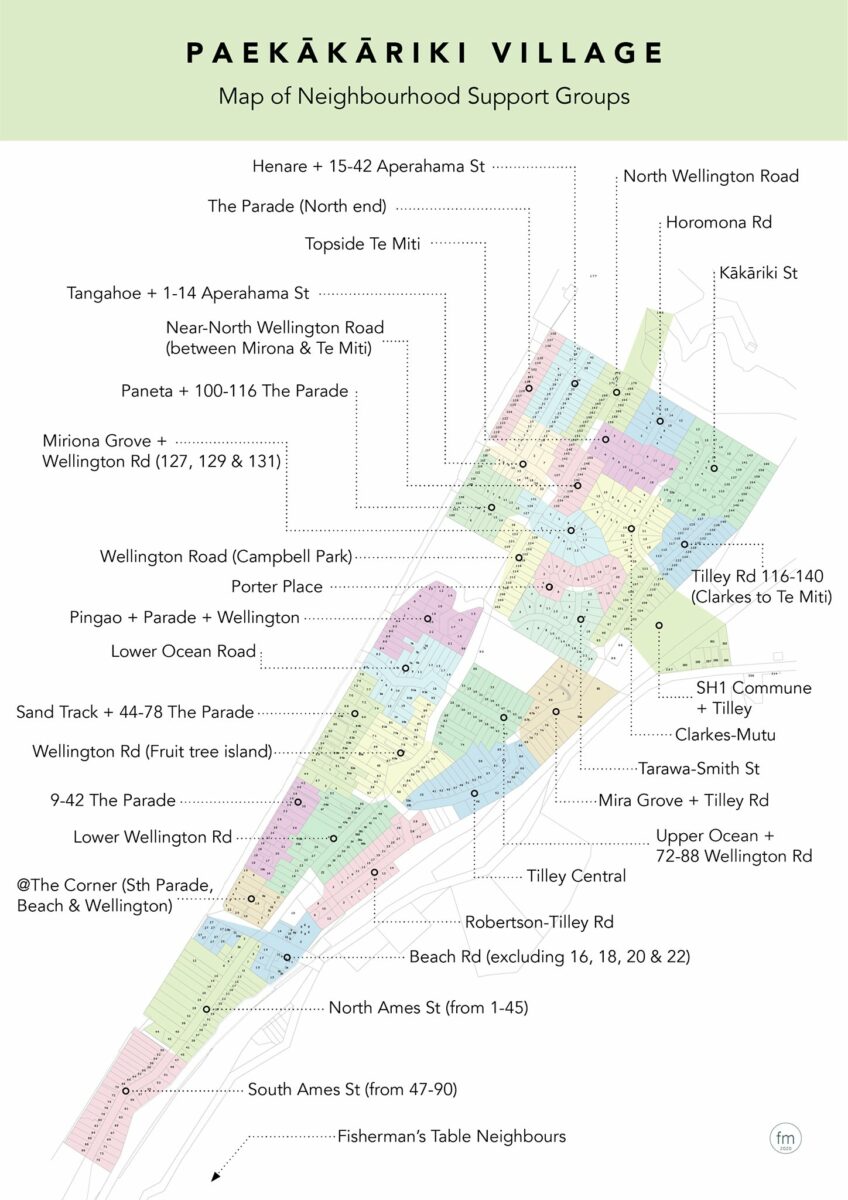
Join your FB group here. For more information or to contact an administrator, get in touch with Kerren ph 027 396 8431 or email: [email protected]
Paekākāriki Village Zui – Virtual village hall gatherings!
Recurring Zoom link here: https://us02web.zoom.us/j/89351304212
This is your chance to connect, ask questions and share when Covid-19 makes such an open hall gatherings difficult.
Brought to you by the Paekākāriki Emergency Preparedness Group, Paekākāriki.nz and the Paekākāriki Community Board.
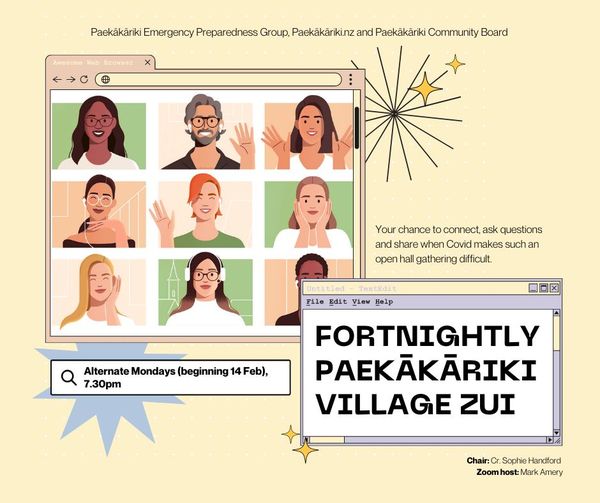
Self Isolation Support – Kāpiti.
This is a Facebook group that coordinates volunteers who are keen and able to provide support to those in the Kāpiti community/neighbourhood who might struggle having to self-isolate or are particularly vulnerable as our community responds to prevent the spread of COVID-19. We see this as an important opportunity to build community connection and resilience, and to look after those in our community who are particularly at risk or might just be needing some support. Over the next few days, and as more information about the situation arises, we will be figuring out a plan for getting volunteers to do practical things like running errands, or doing grocery runs, for people in their neighbourhoods who are self-isolating and might be in need of support in this way. This group will be used to coordinate this response
Local mental health support We have a group of retired counsellors willing to talk with you online or by phone (not replacing professional counselling!) 9am- 9pm. Ring Sylvia Bagnall 021 744 485.
Kapiti Youth Support (KYS) is offering support during opening hours. 0800 333 879
Paekākāriki Housing Trust Emergency accomodation needs and offers. Tina Pope: 027 232 9998
School garden and Potty Potters Food propagation
Paekakariki Orchards and Gardens Food propagation
Paekakariki 88.2FM Community news, music and connection
Volunteers:
The Kāpiti Emergency Operations Centre continues to advise, support and pass on official sources of information to (but not give jobs to or directly task) volunteer groups. If you know of any other groups active in the community, please feel free to pass on my details.
- Volunteer NZ have updated guidelines on volunteering :
Useful Resources – Volunteering New Zealand (volunteeringnz.org.nz)
- MSD and MBIE have essential service status categories this response which Student Volunteer Army are a part of. The MSD website has updated their guidelines around this below
Food Delivery
Countdown has a priority assistance service for food delivery :
priority-assistance (countdown.co.nz)
New World has teamed up with Student Volunteer Army to provide delivery of online groceries
- Stuff has a list of businesses that are delivering across Wellington
Covid 19 NZ: Lockdown deliveries: What you can get, where | Stuff.co.nz
- If you can’t access any of these services and are struggling to get help, you can access Civil Defence support by calling the council on 0800 486 486
Well-being:
- You can order and have free key messages posters delivered to your community group
Posters | Unite against COVID-19 (covid19.govt.nz)
- We are encouraging people to share the campaign below and show support for our pacific peoples as they are sadly having to deal with a rise in racism.
Ministry for Pacific Peoples — We got your back Aotearoa campaign (mpp.govt.nz) There is also well-being support for our Pacific communities on 0800 Ola Lelei – 0800 652 535.
– If you know of people who are feeling anxious, overwhelmed, or need to talk with someone, they can call or text 1737 to speak to a trained counsellor.
Young people can contact Youthline, 0800 376 633 or by free texting 234.
- There are amazing free real-time workshops on whakatau mai for all kinds of interests and backgrounds
The Sessions – Whakatau Mai | The Wellbeing Sessions
Whakatau Mai I The Wellbeing Sessions, by Changing Minds | Facebook
As always, you play a valuable role in letting us know what’s happening out on the ground. Please get in touch and let us know any community concerns or emerging issues you pick up on and I can pass them onto our welfare team. If you are providing or need services for your community whether that’s food packages or an 0800 support number, please also let us know so we can send any support gaps up to the regionally level.
You can connect to the Kāpiti Emergency Operations Centre via my email, [email protected] or phone number below.
Due to the increased risk from the Delta variant, both categories need to be extremely strict about following all health guidelines
Protect yourself and others from COVID-19 | Unite against COVID-19 (covid19.govt.nz)
- We strongly advise everyone who is out helping in the community to be vaccinated. You can book a vaccination here:
Book My Vaccine | Ministry of Health NZ (covid19.health.nz). There may also be other health services offering vaccines locally.
Caremongering: A great website for volunteer groups and those needing support in your area.
30/08/2021 – An update from WREMO:
Here is a one-stop shop of the latest links that might be helpful as you go about your mahi:
Supporting others:
Urgent support:
- There is an 0800 number for seniors 65+ 0800 559 002 / 0800 559 009 (under 65) run through work and income for help with getting food or essential items.
Work and Income can help with urgent costs like: food, accommodation costs, for example rent or mortgage, board, emergency housing, moving house, power, gas, heating or water bills, medical and dental costs
You do not need to be or go on a benefit to access this. It is help for anyone in NZ.
- Whānau Ora helps whānau access health and welfare services, and meet basic needs for food, accommodation, heating, internet connectivity, water and sewerage.
You can contact Whānau Ora on: 0800 929 282 if you are in the North Island
- The Kāpiti foodbank can help with urgent food needs: Kāpiti Community Foodbank (call 04 298 1907)
Accessing food and essential items:
- Unite against Covid has new information and a new fact sheet on access to food:
Access to food or essential items | Unite against COVID-19 (covid19.govt.nz)
- There is a new welfare support contact card out (I have attached this as PDF and JPEG for sharing)
- There is also a tool to help people find the financial support they might need.
COVID-19 financial support tool | Unite against COVID-19 (covid19.govt.nz)

Kerren Hedlund
Living with Covid in France
Kerren Hedlund shares her experience of living in a small village in France in 2022 where almost all the residents contracted Covid-19, including her family of four.
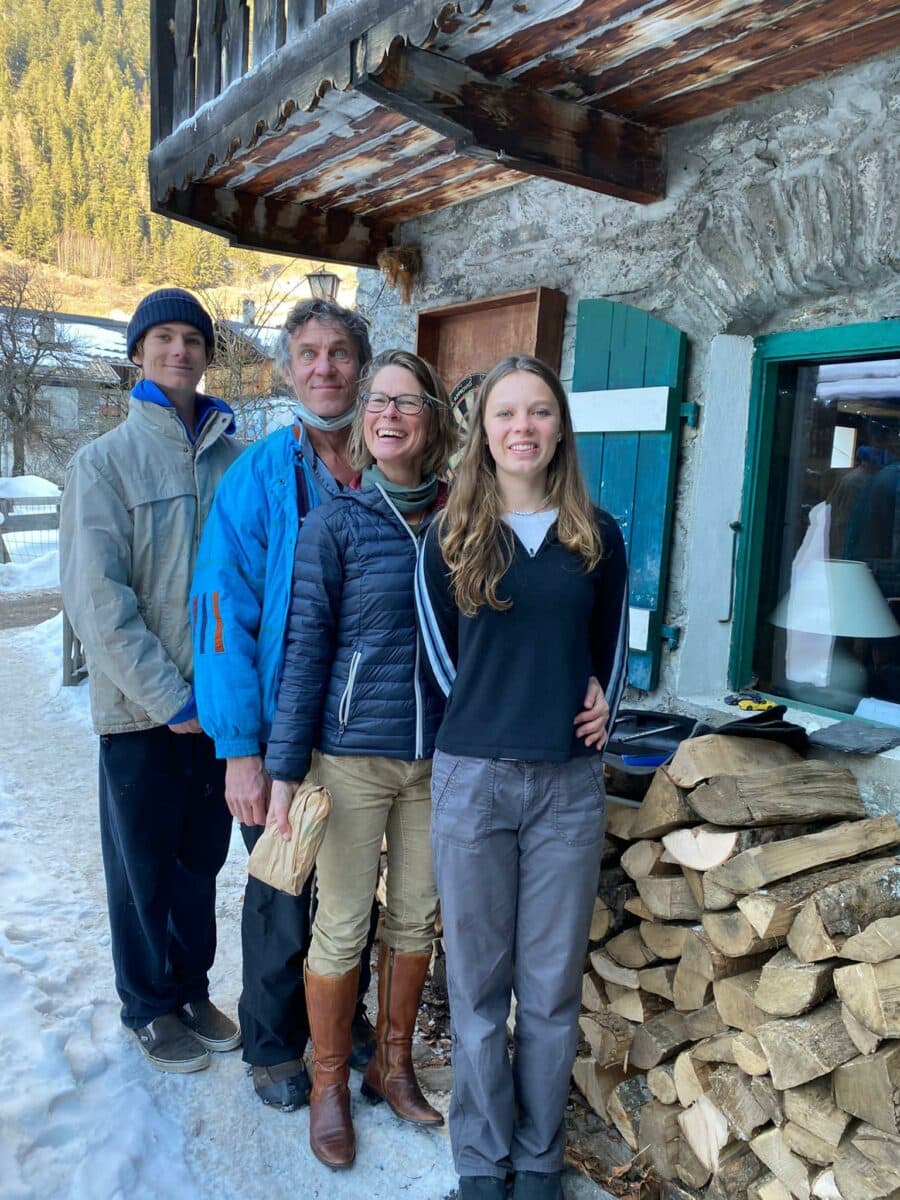
Kia ora e te whānau! Kerren, Justin, Noah (18 years) and Sophie (16 years) here. Back from France where guess what!? We got Covid. Actually, pretty much our whole village of 30 households got Covid. Holiday gatherings and rangatahi coming home from college from the ‘city’ meant that the new variant Omicron spread pretty fast.
What was it like? We are all vaccinated, two shots with the last one in November. But day one in January, Noah looked a little more white than usual! And by day two Sophie was a little more tired than usual. But it wasn’t until Justin woke on the day three with a sore throat and cough that we pulled out our Rapid Antigen Test (RAT) and stuck the swab up our noses! The other three tested positive and I held out for a week before testing positive too (day seven).
I did try not to get it. With all of us wearing masks I ate at the other end of the table, washed my hands all the time, and spent most of my day outside of the house. But I guess it was inevitable living together with the windows and doors closed all day (a snowy winter in the northern hemisphere). Noah was asymptomatic and so was I, pretty much. Just felt a little ‘weird’ on day seven and yup! I tested positive.
Justin had it the worst of us. He was a smoker for 30 years and for the last three years has got a chronic lung infection every winter. I admit: I wasn’t worried for the rest of us but I did worry that it would be rough for him. He did have a very productive cough, fatigue, headaches and loss of smell and taste (none of us ever lost our smell or taste thank goodness! What’s the point of being in France if you can’t taste the cheese!?). He’d get these ‘respiratory crises’ where he really felt he couldn’t get air into his lungs. This happened twice at night and once during the day. We’ve been meditating a lot lately and so he used his meditation breath to bring calm to breathe shallow until he could breathe deep and the ‘crisis’ passed. They lasted 5-10 minutes.
Sophie tested negative first. Then Noah. We did a PCR test with the local hospital before we left France to come back to Aotearoa and were negative (day 14) enabling us to come home. But then tested positive when we arrived at MIQ! Different PCR tests have different levels of sensitivity I was told and bits of virus may show up in our test for up to 3 months even though we are no longer infectious.
Today, we feel great. Not least as Sophie and I did lots of yoga, Zumba, and booty exercises while in MIQ! Justin is doing well too, although still pretty tired. But that is probably more due to the fact he is working the frontline in Sudan at the moment, and his health takes second place to peace and justice!
And our village in France? We all went down at different times. So, we took turns doing the shopping for each other. Of the three families that weren’t vaccinated in our village, two went down. (The third doesn’t have children! Go figure!). Anne Kat (50 years) had it hard, was bedridden for two weeks and lost a lot of weight. She has parallel health problems related to her gut. Bruno (72 years) holed up in bed for a couple of weeks as well. They had symptoms more serious and longer than the rest of us but neither had to go to the hospital. My back-country koro, Jean-Manuel (68 years), might have picked it up from us at dinner on day one. On Saturday night (day two) he woke feeling a bit dizzy. Then he decided to take it easy on Sunday. But by Monday he was back to climbing 1000m. He thinks it must have come and gone. He’s vaccinated too.
So, there you go. My advice after having had it? [Declaration of interest here. I am an international public health professional and have raised my children in Africa and Asia, where vaccines save lives!]. If you don’t want to risk it with your health choose to be vaccinated. If you don’t want to spread it to others, choose to get vaccinated. Wear a mask, stay home at the first sign of a scratchy throat. Before you get it, have a plan with nearby friends and family who can bring you what you need when your household needs to isolate. When you do get it, don’t forget to stop and BREATHE.
Happy to chat more if anyone wants to!
Louise Thornley
Mutual Aid; great examples of communities helping themselves during Covid-19. Every day we wait for official advice from Ashley Bloomfield and Prime Minister Jacinda Adern, but what can communities themselves do during lockdown to be stronger together? Louise Thornley is a former research fellow with Otago University in public health. She also researched community response to the Christchurch earthquakes. As part of Paekākāriki’s Emergency Preparedness Group Thornley has been researching great national and international community responses to the Covid19 epidemic. She spoke to Mark Amery of Paekakariki 88.2FM. Music: Hope by Fat Freddy’s Drop. Read her summary Stronger together: What communities can do in the Covid-19 crisis or read, download and share the full report here.
Kerren Hedlund
We’ve weathered crises in the past; flu epidemics, floods, earthquakes. And we’ve done that because we care for each other and we’re willing to go out of our way to check in on each other and offer help. And that is how we’ll get through COVID too.
It’s early days yet for Aotearoa/New Zealand and the MoH is simply advising staying home if you are sick, calling Helpline to let them know you are self-isolating, washing your hands all the time, and checking in on the vulnerable in our community. Why the last one?
Because people need to know that self-isolation doesn’t have to mean you are alone.
We’ll buy you groceries, talk on the phone with you, find ways of keeping you connected and cared for. We can use this crisis as an opportunity to make us stronger, as individuals and as a community.
My name is Kerren, and I’m one of emergency response volunteers in the village and part of our village Emergency Preparedness group. There are 20 folk in the group that have been active since Kaikoura. (Your name here!)
I’ve lived in Paekākāriki with my whānau (Justin, Noah and Sophie) for nearly 5 years now. Justin and I have lived around the world, responding to humanitarian crisis. While I was not in Uganda for the Ebola crisis, I did work with UNICEF to understand what worked well and what didn’t when responding to the crisis. And the resounding finding was: communities, when empowered with information and support, will use their knowledge of their communities to fight the best fight. Not government. Community.
Justin Corbett
For over 30 years I’ve had the chance to live and work in different countries in Africa and Asia with populations facing a range of different, devastating crises: drought and famine effecting millions; a cyclone that killed 130,000 in a night; brutal, protracted wars that leave millions vulnerable to violence, destitution, torture, death; crippling outbreaks of disease (cholera, malaria, typhoid); the prolonged oppression of abject poverty. And in all those cases, I have always been witness to the extraordinary resilience, adaptability and innovation of affected communities and the countless inspirational acts of kindness, courage and dignity of people facing really terrible situations.
I share this now because I realise that many people will be feeling increasingly anxious and frightening by the levels of change and uncertainty that are being provoked by Covid19. And that in many ways it is the ‘unknown’ nature of the coming weeks and months that is the most difficult aspect of the situation to deal with. Our imaginations run wild, we fear the worst, depression and real fear can at times get the better of us.
But I have always found that in fact when the challenge finally arrives, people always rise to face it with a wonderful mix of spirit , selflessness, courage and humour. Indeed, the chance to help each other in whatever way we can seems to provide that essential boost of energy, fortitude and positivity that allow us not only to survive the worst of crises but to do so with a smile. It’s what gives us the feeling of dignity and self-worth and pride ( in a good way) sense of community that we all need and cherish – even in the good times.
If we hang onto this thought, the uncertainty of the future can become so much less daunting. Whatever happens, we know that not only will we get through it, but that we will do so in a way that brings us closer together and actually strengthens us as individuals and as a community. We are blessed already to have such a good chunk of humanity here in dear Paekākāriki as we do – and there is no doubt that we will see a whole lot more over the coming weeks and months. And if ever you do feel those demons of fear creeping in, try thinking about how other people (now and in times gone by) in this country and around the world have got through worse times with less to support them than we have now. Crises can bring out the best in us. When I see how communities respond to upsets worse than Corona, it makes me so proud to be human.
Do feel free to give a ring any time if a chat on such reflections would help. When I’m out of self-isolation (I got back from Sudan 6 days ago) a pint at the Bowlers is always an option too, provided they remain open. I have felt scared so many times going into very unpredictable and unknown situations – and it has always helped me to talk with someone.
Reminds me that uncertainty needn’t be so alarming. Seems to me that the stability, safety and predictability of life that we have come to expect as normal are in fact a rather unhelpful illusions. Life is not like that at all for most of us on this planet and we are much more adaptable than we realise. Indeed, such times as these often reveal strengths we didn’t know we had.
I have still so much to learn but realising that we (all over the world) are embracing this together helps me find the strength to face whatever comes, calmly. Hearing about Corona, many friends in the small villages in the war zones of Sudan asked me to share their best wishes with “kulu naas hinaak” (all the people there). Which is pretty nice really.
Tihei Mauri ora!
Mark Amery talks with Justin, Holly Ewens, Sophie Handford and Flo McNeill on Paekakariki 88.2FM in a Covid-19 Special

Essential needs
Essential needs welfare line: Struggling to get essentials like food and medication because of COVID-19? Call 0800 486 486, a new Council welfare support number. Staffed between 7am and 7pm, seven days a week. You can also request a callback (quick link to the page for Kāpiti)
Information
- Village-specific info: www.paekakariki.nz
- NZ government: https://covid19.govt.nz
- Symptoms: Healthline 0800 358 5453 or call GP
- Health Navigator: NZ Health information
- Healthpoint – for RAT testing information
- Self-isolation accommodation: 0508 754 163 (24/7).
- Essential supplies and other welfare needs that can’t be met by friends and family: 0800 486 486 (7am-7pm, 7 days)or email for callback www.wremo.nz/callback
- Financial support: 0800 779 997 (8am–1am, 7 days) or on 0800 22 66 57 (9am-5pm, Mon-Fri)
- Current Covid cases NZ
- Live statistics at Worldometers
- Radio NZ
- Subscribe to the Paekakariki.nz e-newsletter
Health
- What to do if you suspect you have Covid-19? Contact Healthline (for free) on 0800 358 5453. They will assess you over the phone and if suspected, they will send you to a swabbing centre at Kapiti Health Centre (by referral only). Or you can ring your GP or contact Team Medical. You must ring ahead. Do not just turn up.
- Capital & Coast District Health Board (CCDHB) are publishing figures every weekday on their Facebook page which help to give you a clearer picture of what is happening in our area.
Financial
- Read up here about assistance for those employed
- Covid-19 financial support tool
Emotional support
- Stay connected to those who make you feel safe and loved. Don’t be afraid to ask for help if you’re feeling overwhelmed. It’s an overwhelming time.
- The Ministry of Health has created a new section on their website with wellbeing tips, answers to FAQs and tikanga advice.
- You can free call or text 1737 at any time to speak with a trained counsellor from the Mental Health Foundation – it’s free and confidential.
- If you need a break from constant streams of news and would like some more headspace, you can sign up to RNZ’s COVID-19 email newsletter. It gives you reliable updates from around the world at 5.30pm every night.
- SPARX is a computer program that helps young people with mild to moderate depression
- If you need support, you can reach out and find resources available on allright.org.nz
- FutureLearn provides youth mental health courses to explore and understand the mental health issues that affect young people. They have a Helping Young People Manage Low Mood and Depression course for young people with low mood and depression and their parents and carers, or anyone who has contact with young people during the coronavirus pandemic.
Housing support
- All those needing emergency accommodation to self-isolate should phone 0508 754 163.
- Contact the Paekākāriki Housing Trust. Tina Pope: 027 232 9998
Transport
- Metlink’s what you need to know under Covid-19.
Education
- Check out the regulations for schools under RED.
Jobs
- Check out the Keep New Zealand working online recruitment tool. It connects job seekers directly to the employer making it quicker and easier for people to find work and also provides online training courses.
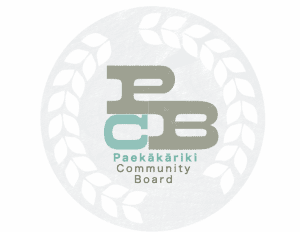
If you need anything – help, information, something else – contact us. We’ll keep your information confidential in line with privacy laws.
CONTACT US
Read our group principles and purpose
Holly Ewens 027 270 7090
Tina Pope 027 232 9998
Dan O’Connell 021 161 5645
Jess Hortop 027 512 5061
Kerren Hedlund 027 396 8431
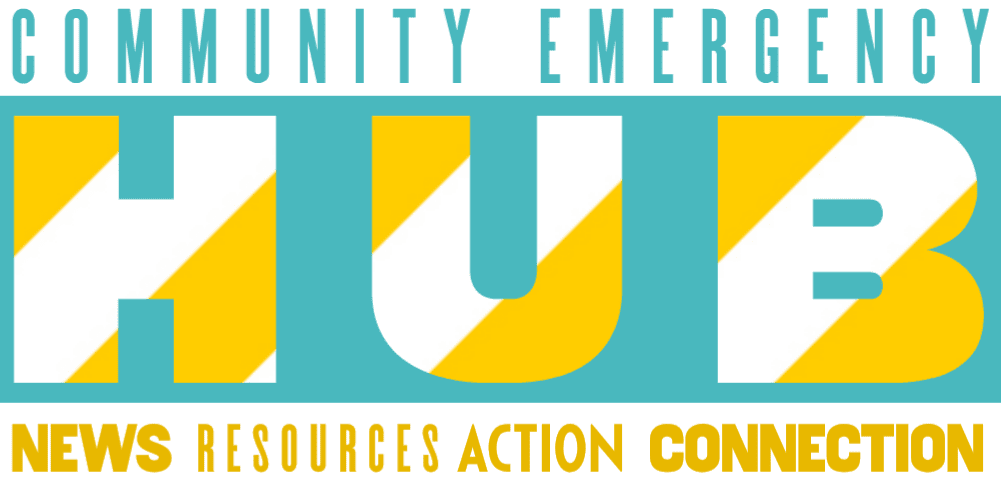
In these trying times we come together to share what we have: skills, experience and knowledge. On this page you will find:
Hot Information — updated regularly
Resources — find local food deliveries, tech help, mental support and more
Local Knowledge — hear from experienced neighbours


Wednesday 13 April 2022
From 11.59pm tonight, all of Aotearoa New Zealand moves to traffic light Orange. Read about the change here.
Thursday 07 April 2022
From Thursday 7 April people aged 16 or 17 can get a COVID-19 booster from any walk-in vaccination site without booking, provided it has been 6 months since completing their primary vaccine course.
You can find a walk-in vaccination site near you here: https://covid19.govt.nz/get-your-covid-19-vaccination/…
From Thursday 14 April bookings can be made through Book My Vaccine. (www.BookMyVaccine.nz)
You can find more information about booster doses here: https://www.health.govt.nz/…/covid-19-vaccine-boosters
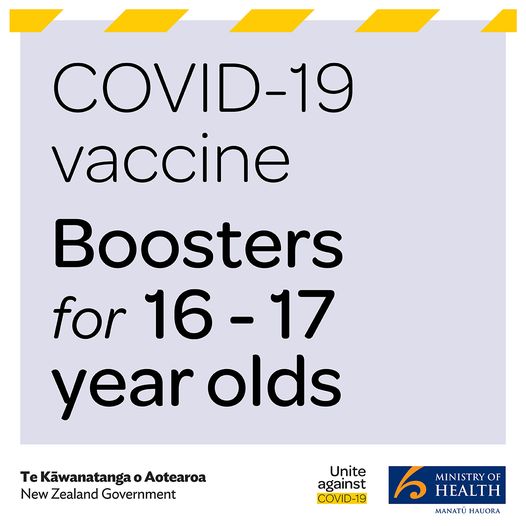
Information and support available for people with disabilities.
Register now for the 111 TXT service so you can contact Fire, Ambulance or Police in an emergency. Find out more at www.police.govt.nz/111-txt
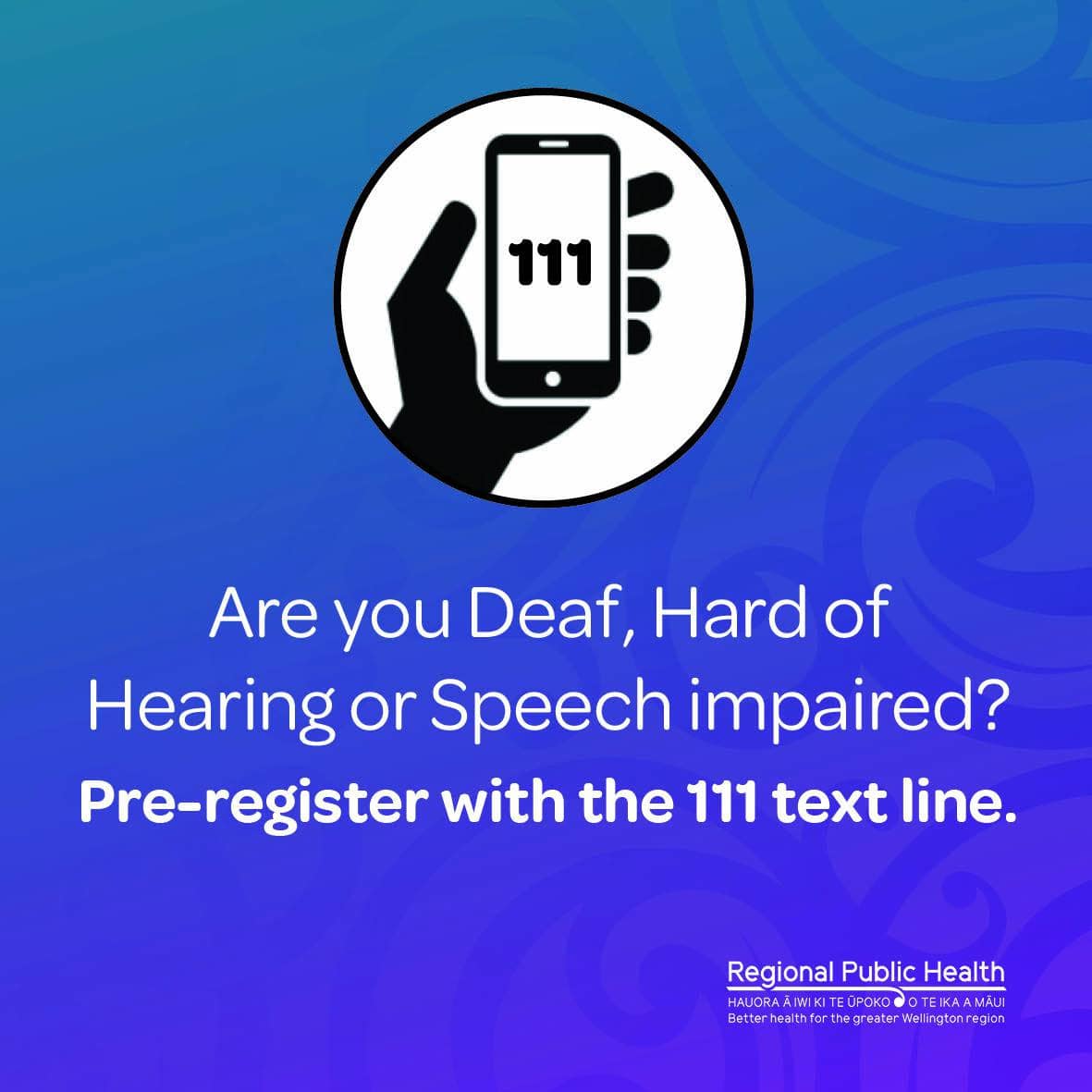
Monday 4 April 2022
Useful information about life after you have had Covid-19.
When can I finish isolating? Anyone who tests positive for COVID-19 or lives with someone who has COVID-19 must isolate for 7 full days from the day symptoms started or a positive result – whichever comes first.
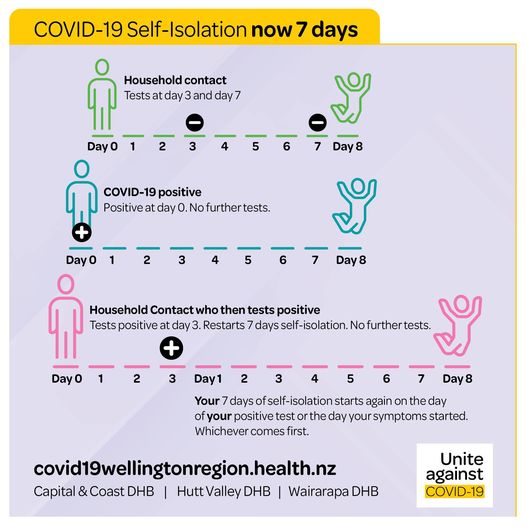
Long Covid: Experts warn against exercising too soon after Covid-19.
Monday 28 March 2022
Are you kids struggling with Covid-related anxiety? Health Navigator has some tips for helping them cope.
If you’re wondering what to expect if you get Covid, The Spinoff has talked to a variety of people about their experience.
Healthy.org.nz is a helpful website with all sorts of Covid-19 related information.
Thursday 24 March 2022
At 11.59pm on Friday 25 March, there are changes to the Red traffic light system. Read about them here. Or watch the explanatory RNZ video here.
Isolating can make us feel blah or alone, or if you’re isolating with small children it can be hard to find some ‘me time’. The Mental Health Foundation of NZ has put some practical and easy ‘wellbeing tips for isolation’ together, and we share a few below:
- Connect/tūhono with your friends and whānau on the phone, through social media, video chats and text.
- Find ways to switch off and recharge. Reading, mindfulness, gardening, organising the house, getting stuck into a project, deep breathing and meditation are all great ways to unwind.
- Remind yourself that this is a temporary period of isolation to slow the spread of the virus and remember that your efforts are helping to keep others safe.
- Find ways to take notice. Take time to feel the sun on your skin and breathe in fresh air whenever you can, even if it’s just through the window! Practice gratitude to help you focus on what’s important – try writing down what you’re grateful for, and what you’re looking forward to.
Check out https://mentalhealth.org.nz/covid…/living-with-covid-19 for the full list and more resources.
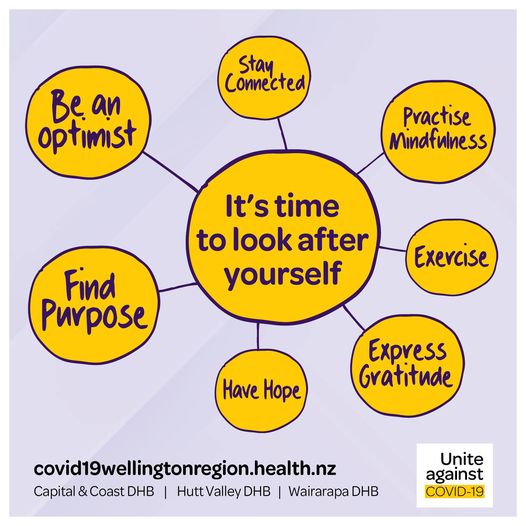
Wednesday 23 March 2022
Need someone to talk to in confidence? The Paekākāriki Mental Health Support Group is available for a chat.
Finding it hard to keep up with all the Covid-19 related rule changes? You may find these FAQs helpful.
Information about what to do if you have Covid-19.
Helpful information for when you have had Covid-19.
Monday 21 March 2022
Advice on how to look after your physical and mental health if you have Covid or are self-isolating.
Lisa Roa, clinical charge nurse, discusses how to look after a child with Covid symptoms. Watch the video here.
Do you or someone you know need help translating health advice into another language? Find out more here.
Thursday 17 March 2022
Watch this cool video by NZ Health Navigator on how to manage your Covid-19 symptoms.
Wednesday 16 March 2022
The Mental Health Foundation has put together a series of Covid wellbeing tips.
From Jono at Paekākāriki Fruit Supply:
Kia Ora folks.
We are doing home delivery for anybody self-isolating in the village.
Text order to 022 516 1348. Or message directly to our Facebook page Paekakariki Fruit Supply.
Orders depending on seasonal and supply availability. Minimum order $30.
Thank you and keep safe everyone.
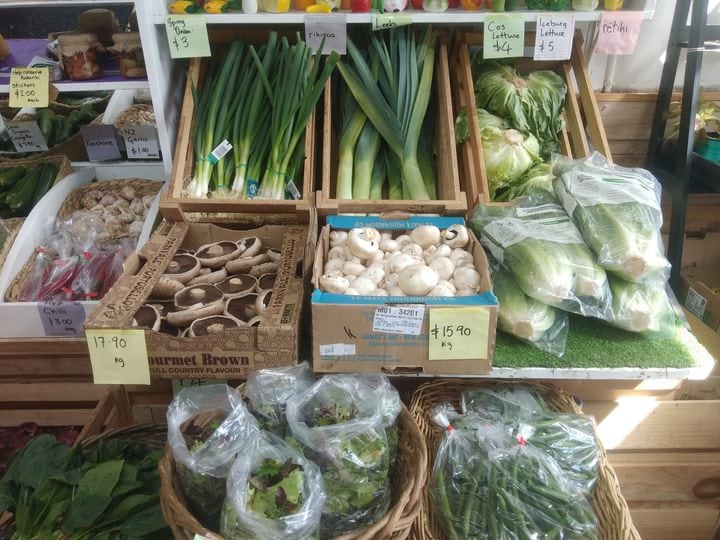
Monday 14 March 2022
Here’s a guide to help you work out when you, and your Household Contacts, can leave self-isolation.
From Saturday 12 March, people who have tested positive will not need to isolate again for 3 months after they have recovered, as the risk of reinfection is very low during this time.
Everyone else will need to isolate again if they test positive or are Household Contacts of a new positive case.
Find out more about self-isolation here.
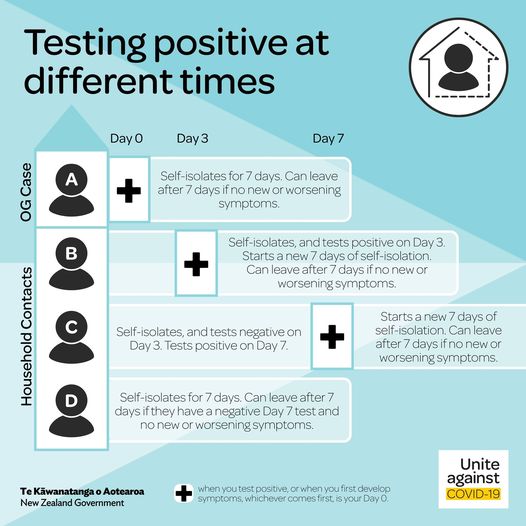
Thursday 10 March 2022
From 11.59pm on Friday 11 March, the self-isolation period changes from 10 days to seven days.
Find out what from the Ministry of Health what to do while self-isolating, including exercise.
Needing some ideas on how to entertain the kids while self-isolating. Here’s 100 of them!
Our Village Grocery Store is selling Rapid Antigen Tests (RATs) from today. Or find out if you are eligible to order a free Rapid Antigen Test (RAT) kit.
Wednesday 09 March 2022
Watch this video on how to take a Rapid Antigen Test correctly.
Find out what financial and well-being help is available when you are self-isolating.
Keen to help pack kai boxes to be sent out to whānau in Kāpiti with Covid? Free this Friday, 11th March? Contact/Message Sophie Handford if you can help.
Tuesday 08 March 2022
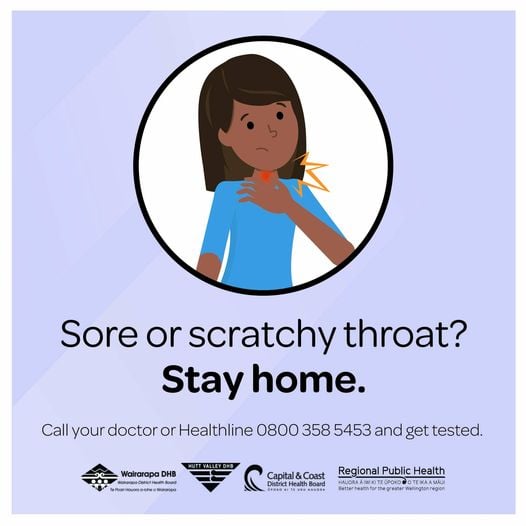
Need a meal while sick or self-isolating? Contact Pae Kai.
Join the Self Isolation Support – Kāpiti Facebook group here.
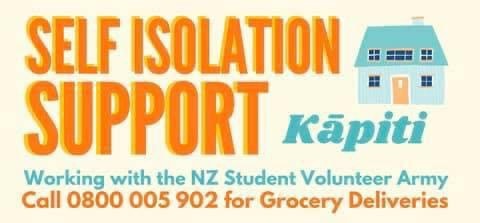
The Student Volunteer Army is offering to deliver groceries to isolated people. Ph: 0800 005 902.
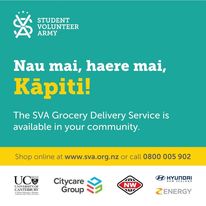
Have you joined your Neighbourhood Support Group? See under Local Resilience Initiatives for details.
Monday 07 March 2022
Find out if you are eligible to order a Rapid Antigen Test (RAT) kit.
Record your RAT result:
It’s important anyone who tests positive records their result. If we know about your result, we also can provide the most appropriate support. Online and data free at: www.mycovidrecord.nz or call 0800 222 478 and select option 3.
Why is it important? You’ll get a text with links to information on what you and your household need to do You’ll be linked into the medical and manaaki support you need such as kai or delivery of your medication. You can tell us about high risk places you visit or stay in, so we can help stop further spread. Easy step by step instructions are here: https://bit.ly/3tlDKnO
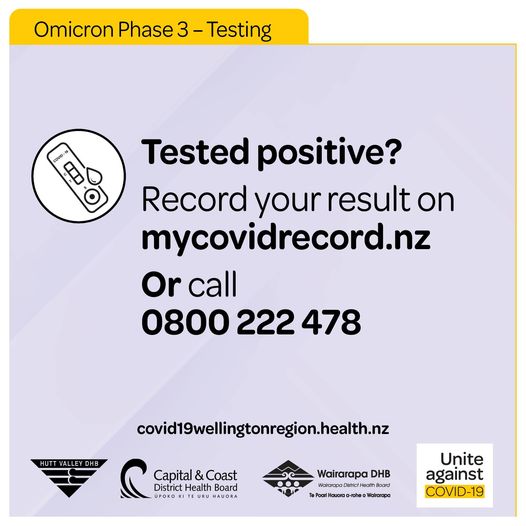
Everything you need to know about RAT.
How to take a RAT
Watch a video of how to take a RAT.
Friday 04 March 2022
You can now pre-order a Rapid Antigen Test (RAT) kit if you are a household contact. Find out how and where and more from RNZ.
Covid-19 testing
RATs Community Collection Site (Pre-order required):
Rapid antigen tests (RATs) can be ordered and then collected at this site by:
- people with COVID-19 symptoms or who are a household contact
- critical workers who are household contacts
- border workers who are required to be tested under the Required Testing Order.
Before going to a collection site, you must place an order via https://requestrats.covid19.health.nz/ OR free call 0800222478
Collection sites are also available in the Hutt Valley DHB region
Wednesday 02 March 2022
Did you know that you don’t need to use your mobile’s data to access these two government’s health sites? Ministry of Health and Unite Against Covid.
Have you checked out Health Navigator? Another excellent source of Covid-19 information.
Tuesday 01 March 2022
To address some of the confusion around Covid-19 isolation for Covid positive cases and their household, Ora Toa PHO has developed a helpful guide that explains the Covid-19 Isolation Clock.
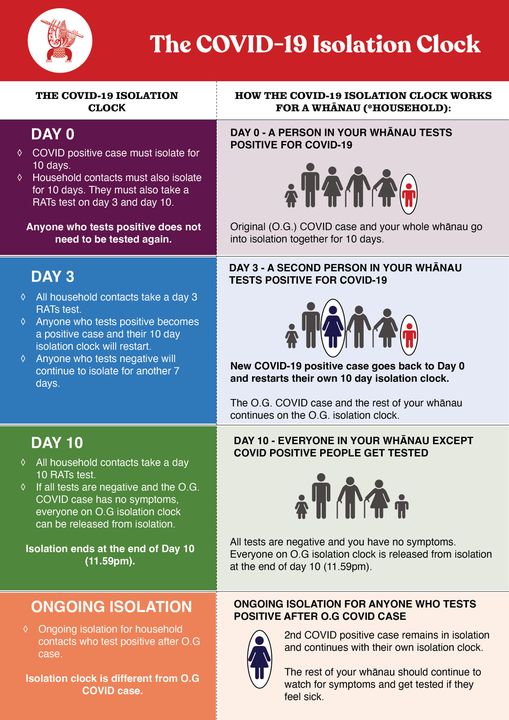
Monday 28 February 2022
Locations of interest are no longer being published under Omicron Phase 3.
Listen to RNZ explain what you need to know if you test positive for Covid-19.
What happens if you test positive for Covid-19.
Household Contacts versus Close Contacts:
- Household Contacts: You are a ‘Household Contact’ if you live in the same house as someone with COVID-19. • You must isolate for 10 days.• Get a test on Days 3 and 8.
- Close Contacts: You are a close contact if you have had contact with someone who has COVID-19, but you do NOT live with them.• You do NOT need to self-isolate.• You should monitor for symptoms and if you develop symptoms, stay home and get a test.
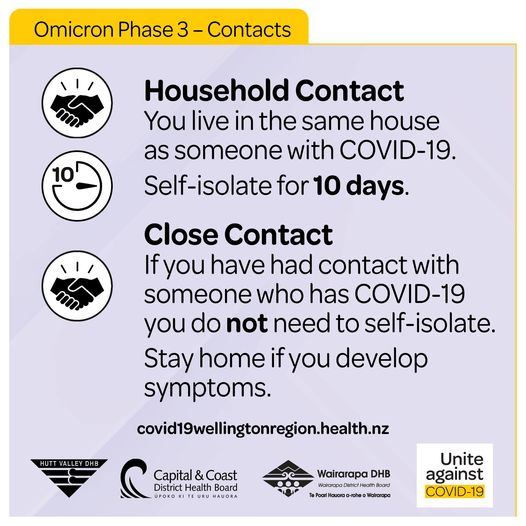

Friday 25 February 2022
Find out the latest advice about Covid-19 testing services.
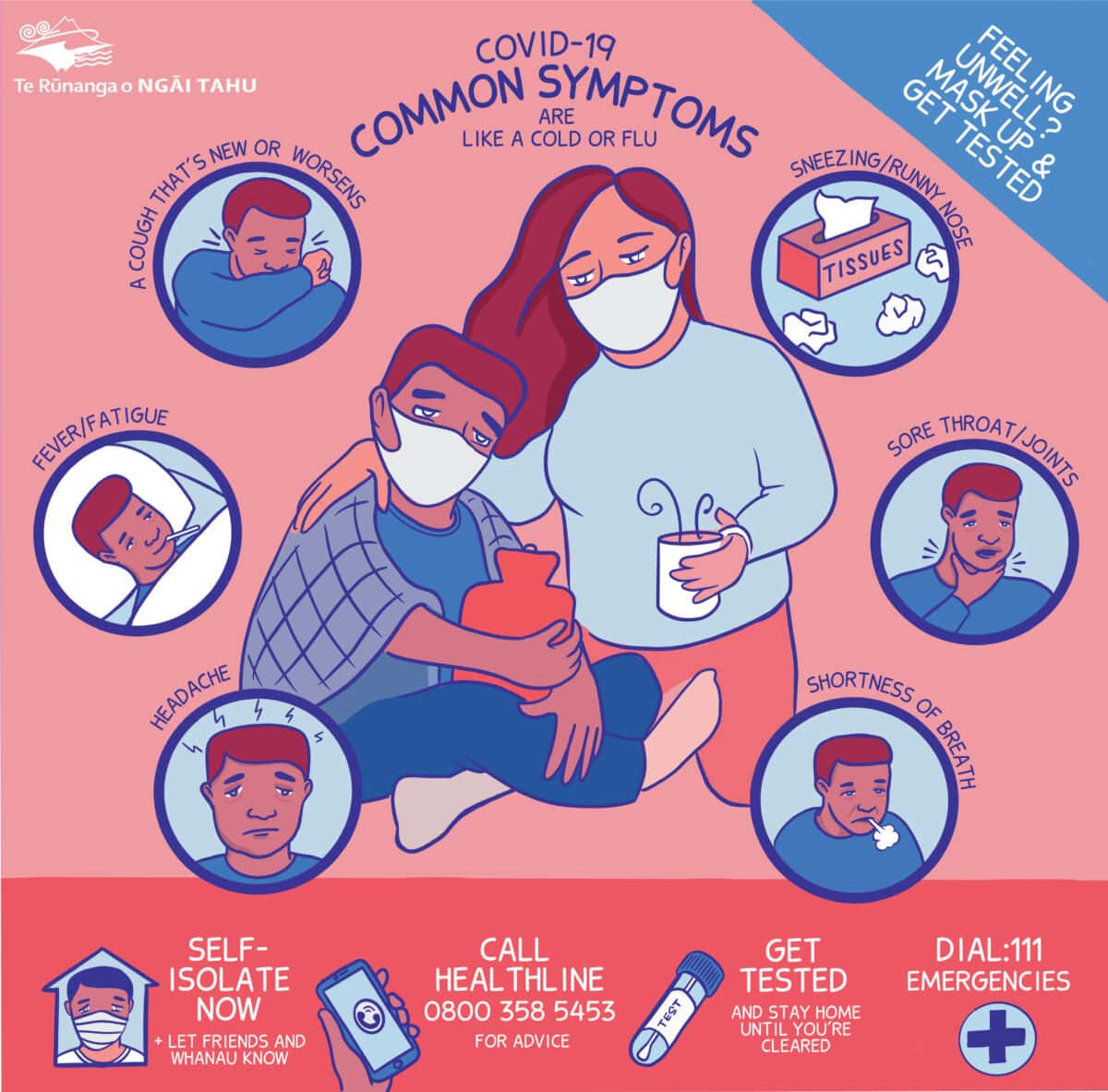
Check out today’s Kāpiti locations of interest here (FB) and here.
Join the Wellington region FB group – Protect Greater Wellington – for news and information specific to this area.

Local food options
When you’re struggling
- Meals on Wheels Contact Paekākāriki local: Joan Hilder (04) 905 8328
- Kapiti Foodbank is open Mon -Fri 10am-12pm Ph: (04) 298 1907
- Pae Kai is available for those that need it. They have frozen meals available those who need a helping hand and provide these as a once (or twice) off gesture of support. They have a limited supply, and are happy to deliver these to you. Don’t be shy about giving them a call either for yourself or for someone you know who may need some support. Email: [email protected]. Phone: 027 405 1109
In the village
- Paekākāriki Village Grocery Store Open daily from 7.30am-7.30pm
- Paekākāriki Fruit Supply Open daily from 9am to 5pm(ish)
- Finn’s Paekākāriki. Open for dine-in and takeaways. Vaccine pass required; if no vaccine pass, please phone for takeaways and the liquor store. ph 04 292 8081
- Beach Road Deli. Open Tues-Thurs 8am-3pm, Fri 8am-8pm, Sat & Sun 8am-4pm. Vaccine pass required.
- Perching Parrot cafe. Open Mon-Fri 7am-4pm, Sat & Sun 9am-4pm. Takeaways only, no vaccine pass required.
Deliveries from outside the village
- M&M Master Butchers delivers to Paekākāriki. Order on-line. $7 delivery fee.
- Waikanae Butchery are open for home deliveries. Call 04 902 6776 to place an order. $5 delivery fee, delivery on Thursday, orders in by close of day Wednesday.
- Grocery delivery support: Self Isolation Support Kapiti (SISK) will be fulfilling a grocery delivery service again on the Kāpiti Coast, operating under the umbrella of the NZ Student Volunteer Army (SVA). The service has a partnership with the New World stores on Kāpiti Rd and in Ōtaki, allowing them to get the supplies they need, without any extra hassle. They encourage people that meet the SVA’s criteria to shop online on their website on or by ringing 0800 005 902. They will handle the delivery of any Kāpiti orders placed with them.
Pickups/takeaways outside the village
- 50/50 restaurant, check out their delicious menu
- Dark Horse Coffee. You can also order at the window or call ahead, 04 298 3425
- Sunday Cantina
- Tom Thumb
- Want to see who else is open locally? Here’s a free, simple web based app with a list, you can even save it to your phone home screen for easy access.
Tech and IT help
- Free IT help remotely: Dan Roscouet Dan Roscouet is available to provide over the phone tech support for those who need help, with things like setting up an internet connection, voice, video, zoom and other ways of electronically communicating with each other. He is on Facebook if people want to message. Ph: 0221 759 484
Medical
- Prescriptions and other necessities: If you need a prescription please order via ‘Manage My Health’ or ring your GP. Request a repeat prescription and request that this be faxed to a pharmacy of your choice and request delivery.
- What to do if you suspect you have Covid-19? Contact Healthline (for free) on 0800 358 5453. They will assess you over the phone and if suspected, they will send you to a swabbing centre at Kapiti Health Centre (by referral only) or you can ring your GP or contact Team Medical. You must ring ahead. Do not just turn up.
Community & wellness
- Local mental health support The community mental health support professionals are available to provide over the phone or face-to-face (if not self-isolating obviously) support. The group of 10 have expertise with general counselling, youth, family/whānau and elderly, acute mental health support, such as working with anxiety, and can provide up to 3 sessions and then help with referrals to other services, such as WellElder. There is even a bloke to talk to! The confidential support can be accessed through Syliva (022 744 485) and she’ll transfer the call to the right person for the job.
- Stronger together: What communities can do in the Covid-19 crisis. A public health researcher, most recently with the University of Otago, Louise also researched community response after the Canterbury earthquakes. She has prepared this research for communities to learn and share. You can read, download and share the full report here.
- Self Isolation Support – Kāpiti. A Facebook Group to build community connection and resilience.
- Neighbourhood groups. All residences should now be contacted by their neighbours. If you haven’t already heard from your neighbours, please write a note and put it in their letterbox. Ring Flo McNeill: 021 139 3581.
- Kapiti Youth Support (KYS) is offering support during opening hours. 0800 333 879
- Caremongering: A great website for volunteer groups and those needing support in your area.
- FutureLearn provides youth mental health courses to explore and understand the mental health issues that affect young people. They have a Helping Young People Manage Low Mood and Depression course for young people with low mood and depression and their parents and carers, or anyone who has contact with young people during the coronavirus pandemic.

Volunteers, read the Volunteer guidelines from Volunteer Kapiti
Join your neighbourhood support group.

Join your FB group here. For more information or to contact an administrator, get in touch with Kerren ph 027 396 8431 or email: [email protected]
Paekākāriki Village Zui – Virtual village hall gatherings!
Recurring Zoom link here: https://us02web.zoom.us/j/89351304212
This is your chance to connect, ask questions and share when Covid-19 makes such an open hall gatherings difficult.
Brought to you by the Paekākāriki Emergency Preparedness Group, Paekākāriki.nz and the Paekākāriki Community Board.

Self Isolation Support – Kāpiti.
This is a Facebook group that coordinates volunteers who are keen and able to provide support to those in the Kāpiti community/neighbourhood who might struggle having to self-isolate or are particularly vulnerable as our community responds to prevent the spread of COVID-19. We see this as an important opportunity to build community connection and resilience, and to look after those in our community who are particularly at risk or might just be needing some support. Over the next few days, and as more information about the situation arises, we will be figuring out a plan for getting volunteers to do practical things like running errands, or doing grocery runs, for people in their neighbourhoods who are self-isolating and might be in need of support in this way. This group will be used to coordinate this response
Local mental health support We have a group of retired counsellors willing to talk with you online or by phone (not replacing professional counselling!) 9am- 9pm. Ring Sylvia Bagnall 021 744 485.
Kapiti Youth Support (KYS) is offering support during opening hours. 0800 333 879
Paekākāriki Housing Trust Emergency accomodation needs and offers. Tina Pope: 027 232 9998
School garden and Potty Potters Food propagation
Paekakariki Orchards and Gardens Food propagation
Paekakariki 88.2FM Community news, music and connection
Volunteers:
The Kāpiti Emergency Operations Centre continues to advise, support and pass on official sources of information to (but not give jobs to or directly task) volunteer groups. If you know of any other groups active in the community, please feel free to pass on my details.
- Volunteer NZ have updated guidelines on volunteering :
Useful Resources – Volunteering New Zealand (volunteeringnz.org.nz)
- MSD and MBIE have essential service status categories this response which Student Volunteer Army are a part of. The MSD website has updated their guidelines around this below
Food Delivery
Countdown has a priority assistance service for food delivery :
priority-assistance (countdown.co.nz)
New World has teamed up with Student Volunteer Army to provide delivery of online groceries
- Stuff has a list of businesses that are delivering across Wellington
Covid 19 NZ: Lockdown deliveries: What you can get, where | Stuff.co.nz
- If you can’t access any of these services and are struggling to get help, you can access Civil Defence support by calling the council on 0800 486 486
Well-being:
- You can order and have free key messages posters delivered to your community group
Posters | Unite against COVID-19 (covid19.govt.nz)
- We are encouraging people to share the campaign below and show support for our pacific peoples as they are sadly having to deal with a rise in racism.
Ministry for Pacific Peoples — We got your back Aotearoa campaign (mpp.govt.nz) There is also well-being support for our Pacific communities on 0800 Ola Lelei – 0800 652 535.
– If you know of people who are feeling anxious, overwhelmed, or need to talk with someone, they can call or text 1737 to speak to a trained counsellor.
Young people can contact Youthline, 0800 376 633 or by free texting 234.
- There are amazing free real-time workshops on whakatau mai for all kinds of interests and backgrounds
The Sessions – Whakatau Mai | The Wellbeing Sessions
Whakatau Mai I The Wellbeing Sessions, by Changing Minds | Facebook
As always, you play a valuable role in letting us know what’s happening out on the ground. Please get in touch and let us know any community concerns or emerging issues you pick up on and I can pass them onto our welfare team. If you are providing or need services for your community whether that’s food packages or an 0800 support number, please also let us know so we can send any support gaps up to the regionally level.
You can connect to the Kāpiti Emergency Operations Centre via my email, [email protected] or phone number below.
Due to the increased risk from the Delta variant, both categories need to be extremely strict about following all health guidelines
Protect yourself and others from COVID-19 | Unite against COVID-19 (covid19.govt.nz)
- We strongly advise everyone who is out helping in the community to be vaccinated. You can book a vaccination here:
Book My Vaccine | Ministry of Health NZ (covid19.health.nz). There may also be other health services offering vaccines locally.
Caremongering: A great website for volunteer groups and those needing support in your area.
30/08/2021 – An update from WREMO:
Here is a one-stop shop of the latest links that might be helpful as you go about your mahi:
Supporting others:
Urgent support:
- There is an 0800 number for seniors 65+ 0800 559 002 / 0800 559 009 (under 65) run through work and income for help with getting food or essential items.
Work and Income can help with urgent costs like: food, accommodation costs, for example rent or mortgage, board, emergency housing, moving house, power, gas, heating or water bills, medical and dental costs
You do not need to be or go on a benefit to access this. It is help for anyone in NZ.
- Whānau Ora helps whānau access health and welfare services, and meet basic needs for food, accommodation, heating, internet connectivity, water and sewerage.
You can contact Whānau Ora on: 0800 929 282 if you are in the North Island
- The Kāpiti foodbank can help with urgent food needs: Kāpiti Community Foodbank (call 04 298 1907)
Accessing food and essential items:
- Unite against Covid has new information and a new fact sheet on access to food:
Access to food or essential items | Unite against COVID-19 (covid19.govt.nz)
- There is a new welfare support contact card out (I have attached this as PDF and JPEG for sharing)
- There is also a tool to help people find the financial support they might need.
COVID-19 financial support tool | Unite against COVID-19 (covid19.govt.nz)

Kerren Hedlund
Living with Covid in France
Kerren Hedlund shares her experience of living in a small village in France in 2022 where almost all the residents contracted Covid-19, including her family of four.

Kia ora e te whānau! Kerren, Justin, Noah (18 years) and Sophie (16 years) here. Back from France where guess what!? We got Covid. Actually, pretty much our whole village of 30 households got Covid. Holiday gatherings and rangatahi coming home from college from the ‘city’ meant that the new variant Omicron spread pretty fast.
What was it like? We are all vaccinated, two shots with the last one in November. But day one in January, Noah looked a little more white than usual! And by day two Sophie was a little more tired than usual. But it wasn’t until Justin woke on the day three with a sore throat and cough that we pulled out our Rapid Antigen Test (RAT) and stuck the swab up our noses! The other three tested positive and I held out for a week before testing positive too (day seven).
I did try not to get it. With all of us wearing masks I ate at the other end of the table, washed my hands all the time, and spent most of my day outside of the house. But I guess it was inevitable living together with the windows and doors closed all day (a snowy winter in the northern hemisphere). Noah was asymptomatic and so was I, pretty much. Just felt a little ‘weird’ on day seven and yup! I tested positive.
Justin had it the worst of us. He was a smoker for 30 years and for the last three years has got a chronic lung infection every winter. I admit: I wasn’t worried for the rest of us but I did worry that it would be rough for him. He did have a very productive cough, fatigue, headaches and loss of smell and taste (none of us ever lost our smell or taste thank goodness! What’s the point of being in France if you can’t taste the cheese!?). He’d get these ‘respiratory crises’ where he really felt he couldn’t get air into his lungs. This happened twice at night and once during the day. We’ve been meditating a lot lately and so he used his meditation breath to bring calm to breathe shallow until he could breathe deep and the ‘crisis’ passed. They lasted 5-10 minutes.
Sophie tested negative first. Then Noah. We did a PCR test with the local hospital before we left France to come back to Aotearoa and were negative (day 14) enabling us to come home. But then tested positive when we arrived at MIQ! Different PCR tests have different levels of sensitivity I was told and bits of virus may show up in our test for up to 3 months even though we are no longer infectious.
Today, we feel great. Not least as Sophie and I did lots of yoga, Zumba, and booty exercises while in MIQ! Justin is doing well too, although still pretty tired. But that is probably more due to the fact he is working the frontline in Sudan at the moment, and his health takes second place to peace and justice!
And our village in France? We all went down at different times. So, we took turns doing the shopping for each other. Of the three families that weren’t vaccinated in our village, two went down. (The third doesn’t have children! Go figure!). Anne Kat (50 years) had it hard, was bedridden for two weeks and lost a lot of weight. She has parallel health problems related to her gut. Bruno (72 years) holed up in bed for a couple of weeks as well. They had symptoms more serious and longer than the rest of us but neither had to go to the hospital. My back-country koro, Jean-Manuel (68 years), might have picked it up from us at dinner on day one. On Saturday night (day two) he woke feeling a bit dizzy. Then he decided to take it easy on Sunday. But by Monday he was back to climbing 1000m. He thinks it must have come and gone. He’s vaccinated too.
So, there you go. My advice after having had it? [Declaration of interest here. I am an international public health professional and have raised my children in Africa and Asia, where vaccines save lives!]. If you don’t want to risk it with your health choose to be vaccinated. If you don’t want to spread it to others, choose to get vaccinated. Wear a mask, stay home at the first sign of a scratchy throat. Before you get it, have a plan with nearby friends and family who can bring you what you need when your household needs to isolate. When you do get it, don’t forget to stop and BREATHE.
Happy to chat more if anyone wants to!
Louise Thornley
Mutual Aid; great examples of communities helping themselves during Covid-19. Every day we wait for official advice from Ashley Bloomfield and Prime Minister Jacinda Adern, but what can communities themselves do during lockdown to be stronger together? Louise Thornley is a former research fellow with Otago University in public health. She also researched community response to the Christchurch earthquakes. As part of Paekākāriki’s Emergency Preparedness Group Thornley has been researching great national and international community responses to the Covid19 epidemic. She spoke to Mark Amery of Paekakariki 88.2FM. Music: Hope by Fat Freddy’s Drop. Read her summary Stronger together: What communities can do in the Covid-19 crisis or read, download and share the full report here.
Kerren Hedlund
We’ve weathered crises in the past; flu epidemics, floods, earthquakes. And we’ve done that because we care for each other and we’re willing to go out of our way to check in on each other and offer help. And that is how we’ll get through COVID too.
It’s early days yet for Aotearoa/New Zealand and the MoH is simply advising staying home if you are sick, calling Helpline to let them know you are self-isolating, washing your hands all the time, and checking in on the vulnerable in our community. Why the last one?
Because people need to know that self-isolation doesn’t have to mean you are alone.
We’ll buy you groceries, talk on the phone with you, find ways of keeping you connected and cared for. We can use this crisis as an opportunity to make us stronger, as individuals and as a community.
My name is Kerren, and I’m one of emergency response volunteers in the village and part of our village Emergency Preparedness group. There are 20 folk in the group that have been active since Kaikoura. (Your name here!)
I’ve lived in Paekākāriki with my whānau (Justin, Noah and Sophie) for nearly 5 years now. Justin and I have lived around the world, responding to humanitarian crisis. While I was not in Uganda for the Ebola crisis, I did work with UNICEF to understand what worked well and what didn’t when responding to the crisis. And the resounding finding was: communities, when empowered with information and support, will use their knowledge of their communities to fight the best fight. Not government. Community.
Justin Corbett
For over 30 years I’ve had the chance to live and work in different countries in Africa and Asia with populations facing a range of different, devastating crises: drought and famine effecting millions; a cyclone that killed 130,000 in a night; brutal, protracted wars that leave millions vulnerable to violence, destitution, torture, death; crippling outbreaks of disease (cholera, malaria, typhoid); the prolonged oppression of abject poverty. And in all those cases, I have always been witness to the extraordinary resilience, adaptability and innovation of affected communities and the countless inspirational acts of kindness, courage and dignity of people facing really terrible situations.
I share this now because I realise that many people will be feeling increasingly anxious and frightening by the levels of change and uncertainty that are being provoked by Covid19. And that in many ways it is the ‘unknown’ nature of the coming weeks and months that is the most difficult aspect of the situation to deal with. Our imaginations run wild, we fear the worst, depression and real fear can at times get the better of us.
But I have always found that in fact when the challenge finally arrives, people always rise to face it with a wonderful mix of spirit , selflessness, courage and humour. Indeed, the chance to help each other in whatever way we can seems to provide that essential boost of energy, fortitude and positivity that allow us not only to survive the worst of crises but to do so with a smile. It’s what gives us the feeling of dignity and self-worth and pride ( in a good way) sense of community that we all need and cherish – even in the good times.
If we hang onto this thought, the uncertainty of the future can become so much less daunting. Whatever happens, we know that not only will we get through it, but that we will do so in a way that brings us closer together and actually strengthens us as individuals and as a community. We are blessed already to have such a good chunk of humanity here in dear Paekākāriki as we do – and there is no doubt that we will see a whole lot more over the coming weeks and months. And if ever you do feel those demons of fear creeping in, try thinking about how other people (now and in times gone by) in this country and around the world have got through worse times with less to support them than we have now. Crises can bring out the best in us. When I see how communities respond to upsets worse than Corona, it makes me so proud to be human.
Do feel free to give a ring any time if a chat on such reflections would help. When I’m out of self-isolation (I got back from Sudan 6 days ago) a pint at the Bowlers is always an option too, provided they remain open. I have felt scared so many times going into very unpredictable and unknown situations – and it has always helped me to talk with someone.
Reminds me that uncertainty needn’t be so alarming. Seems to me that the stability, safety and predictability of life that we have come to expect as normal are in fact a rather unhelpful illusions. Life is not like that at all for most of us on this planet and we are much more adaptable than we realise. Indeed, such times as these often reveal strengths we didn’t know we had.
I have still so much to learn but realising that we (all over the world) are embracing this together helps me find the strength to face whatever comes, calmly. Hearing about Corona, many friends in the small villages in the war zones of Sudan asked me to share their best wishes with “kulu naas hinaak” (all the people there). Which is pretty nice really.
Tihei Mauri ora!
Mark Amery talks with Justin, Holly Ewens, Sophie Handford and Flo McNeill on Paekakariki 88.2FM in a Covid-19 Special

Essential needs
Essential needs welfare line: Struggling to get essentials like food and medication because of COVID-19? Call 0800 486 486, a new Council welfare support number. Staffed between 7am and 7pm, seven days a week. You can also request a callback (quick link to the page for Kāpiti)
Information
- Village-specific info: www.paekakariki.nz
- NZ government: https://covid19.govt.nz
- Symptoms: Healthline 0800 358 5453 or call GP
- Health Navigator: NZ Health information
- Healthpoint – for RAT testing information
- Self-isolation accommodation: 0508 754 163 (24/7).
- Essential supplies and other welfare needs that can’t be met by friends and family: 0800 486 486 (7am-7pm, 7 days)or email for callback www.wremo.nz/callback
- Financial support: 0800 779 997 (8am–1am, 7 days) or on 0800 22 66 57 (9am-5pm, Mon-Fri)
- Current Covid cases NZ
- Live statistics at Worldometers
- Radio NZ
- Subscribe to the Paekakariki.nz e-newsletter
Health
- What to do if you suspect you have Covid-19? Contact Healthline (for free) on 0800 358 5453. They will assess you over the phone and if suspected, they will send you to a swabbing centre at Kapiti Health Centre (by referral only). Or you can ring your GP or contact Team Medical. You must ring ahead. Do not just turn up.
- Capital & Coast District Health Board (CCDHB) are publishing figures every weekday on their Facebook page which help to give you a clearer picture of what is happening in our area.
Financial
- Read up here about assistance for those employed
- Covid-19 financial support tool
Emotional support
- Stay connected to those who make you feel safe and loved. Don’t be afraid to ask for help if you’re feeling overwhelmed. It’s an overwhelming time.
- The Ministry of Health has created a new section on their website with wellbeing tips, answers to FAQs and tikanga advice.
- You can free call or text 1737 at any time to speak with a trained counsellor from the Mental Health Foundation – it’s free and confidential.
- If you need a break from constant streams of news and would like some more headspace, you can sign up to RNZ’s COVID-19 email newsletter. It gives you reliable updates from around the world at 5.30pm every night.
- SPARX is a computer program that helps young people with mild to moderate depression
- If you need support, you can reach out and find resources available on allright.org.nz
- FutureLearn provides youth mental health courses to explore and understand the mental health issues that affect young people. They have a Helping Young People Manage Low Mood and Depression course for young people with low mood and depression and their parents and carers, or anyone who has contact with young people during the coronavirus pandemic.
Housing support
- All those needing emergency accommodation to self-isolate should phone 0508 754 163.
- Contact the Paekākāriki Housing Trust. Tina Pope: 027 232 9998
Transport
- Metlink’s what you need to know under Covid-19.
Education
- Check out the regulations for schools under RED.
Jobs
- Check out the Keep New Zealand working online recruitment tool. It connects job seekers directly to the employer making it quicker and easier for people to find work and also provides online training courses.

If you need anything – help, information, something else – contact us. We’ll keep your information confidential in line with privacy laws.
CONTACT US
Read our group principles and purpose
Holly Ewens 027 270 7090
Tina Pope 027 232 9998
Dan O’Connell 021 161 5645
Jess Hortop 027 512 5061
Kerren Hedlund 027 396 8431



